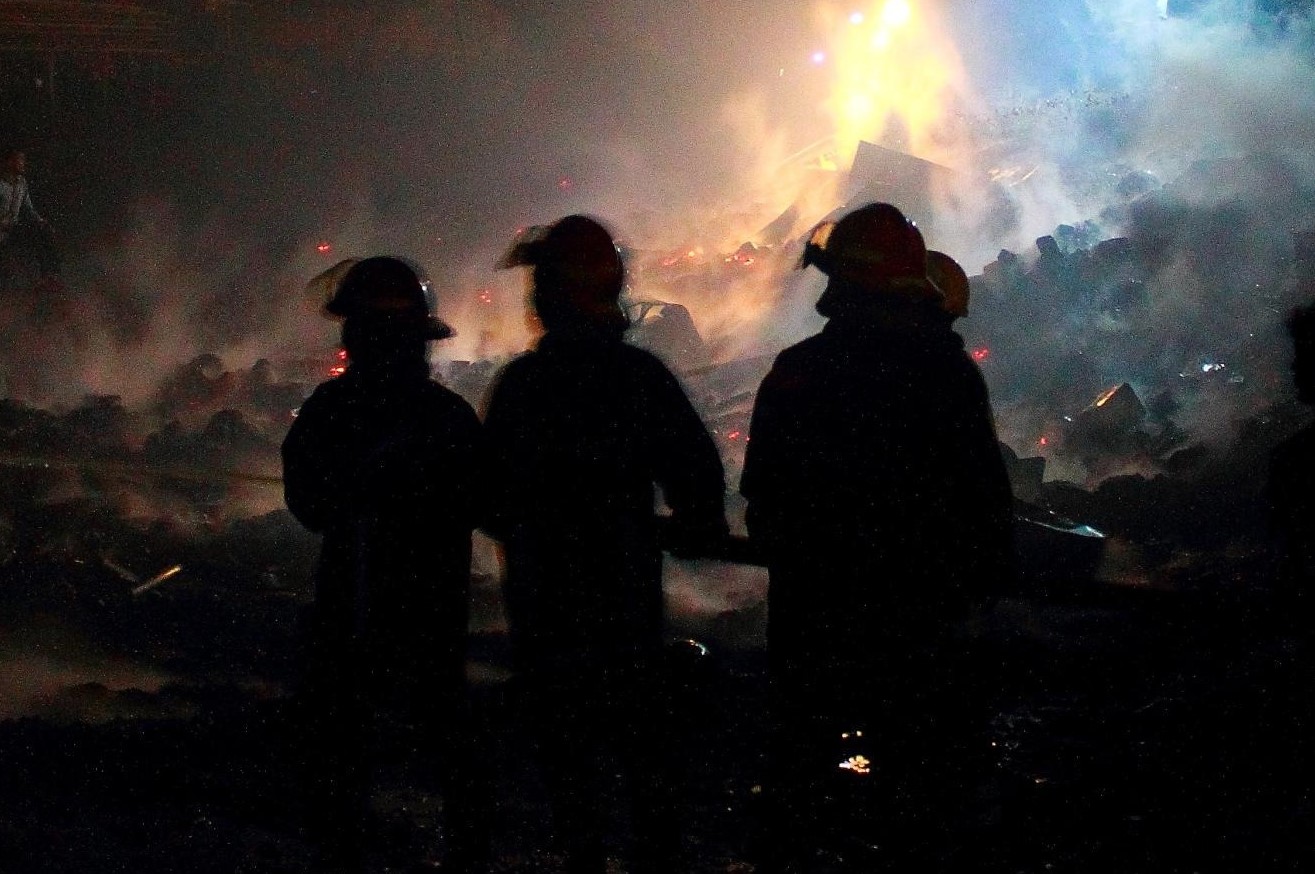On Saturday 4 June 2022, a fire followed by a large explosion occurred at the Dutch-Bangladeshi-owned BM Inland Container Depot in the Chittagong district of Bangladesh, killing at least 49 people and injuring around 300 others. As details emerge of how this tragedy occurred, it is becoming clear that this was another case of workers dying for bosses’ profit.
There were approximately 3,000 containers in the depot the night the fire broke out, 33 of which contained hydrogen peroxide. However, the containers were not correctly labelled, and firefighters were not informed of this fact. “When the fire first broke out, we were told the depot only had ready-made garment products,” said Fire Service and Civil Defence (FSCD) director Mohammad Rezaul Karim. “Had our firefighters known there were chemicals, they could have taken more precautions.”
Being misinformed as to the contents of the containers, the firefighters doused the fire with water (instead of foam). This triggered an enormous explosion as the containers filled with chemicals ignited, one after another. The blast was so powerful that it was felt kilometres away, and it shattered the glass windows of nearby buildings.
Among the 26 firefighters who initially responded to the fire, nine have died, three are missing, and 14 others have been severely injured and were hospitalised. A report from the Dhaka Tribune paints a gruesome picture of “body parts scattered, faces incinerated, limbs turned into images of horror”.
Zahidul Islam, a student of Chittagong University, was one of the volunteers who donated blood to the victims. He described how many of the injured were screaming in pain, having lost limbs. “Ambulances were coming in every five minutes. The emergency unit was full. There was no bed available”, Islam said. “Doctors treated the patients wherever it was possible”.
Elias Chowdhury, regional chief doctor, told the media that the number of dead was 49 but that this figure would likely increase, as about 20 people remained in critical condition with burns covering 60%-90% of their bodies. The injured had been taken to different hospitals in the region, and doctors were called back from holiday to help with the emergency.
Whilst information is continuing to emerge about how this disaster unfolded, it is becoming clear that, once more, the greed of the capitalist class has resulted in scenes of horror and death. Workers at the depot who are now recovering from injuries sustained in the fire and blast have told reporters of the kind of conditions that they are subjected to. Whilst 12 hour shifts are common, when change over between shifts takes place on Saturdays, workers will regularly work double shifts. In other words, the night that this disaster happened, many workers will have been working 24 hour shifts!
Survivors of a Bangladesh container depot fire, which killed 40 and injured 200+, demand compensation from the Dutch co-owned company.
— AJ+ (@ajplus) June 10, 2022
Multiple employees fear being blinded after chemicals and glass hit their eyes.
Industrial fires killed at least 200 in Bangladesh since 2017. pic.twitter.com/5I9WXcUYUg
Bangladesh is seen as a free-for-all for international capital. The ruling gangsters do not care for the lives and working conditions of ordinary people.
The result is a long list of tragedies in Bangladesh’s recent history, of which this container fire is merely the latest. No less than 2,000 workers have died in 26 fires over the last 20 years. Only last year, Bangladeshi child labourers were burned alive in a factory fire. The more than 1,100 garment workers killed in the 2013 Rana Plaza building collapse – the deadliest industrial accident in Bangladesh’s history – still have not been given proper justice. It is a matter widely acknowledged that the capitalist culprits responsible for these new tragedies will not be subjected to proper justice, under this criminal regime of rogues and thugs.
The picture these events paint is one of abject misery for the mass of ordinary working-class people in the country. These events clearly demonstrate what Karl Marx meant when he wrote that “capital comes dripping from head to foot, from every pore, with blood and dirt”.
Whilst capitalism creates scenes of horror and tragedy for the workers of Bangladesh, the rich people are bathing in enormous profits, loot, and plunder. According to the New York-based research firm, Wealth-X, between 2010 to 2019, Bangladesh saw the sharpest rise in the proportion of rich people (defined as those with a wealth over $5 million) anywhere in the whole world. According to the report “Average annual growth rate of population with net worth of $ 5 million or more in last 10 years has risen 14.3 per cent in Bangladesh”.
This has been possible on account of the extreme exploitation of the working class, who are subjected to some of the lowest wages in the world, and atrocious working conditions with no trade union rights. Female workers are the most exploited and have to live in dungeons and backward spaces all their lives. In workplaces, protective equipment and other safety measures are never provided. The capitalists consider the pennies saved by skimping on safety to be more important than the lives of the workers themselves.
In Bangladesh, trade union rights are severely repressed by the ruling class. But despite this, workers have been taking to the streets to protest against the rise of the cost of living due to inflation, stagnant wages, and horrid working conditions.
Workers and youth must fight for the right to establish unions without restrictions. Only the organised might of the working class will be able to fight for improved wages and conditions.
The events we are seeing, including these increasingly common tragedies, are going to shape the consciousness of the Bangladeshi youth and working class. The objective conditions for explosions of the class struggle in Bangladesh are being prepared. The task of building a revolutionary Marxist organisation, capable of giving the youth and labour movement a programme and perspectives, in Bangladesh must be approached with the utmost urgency.

